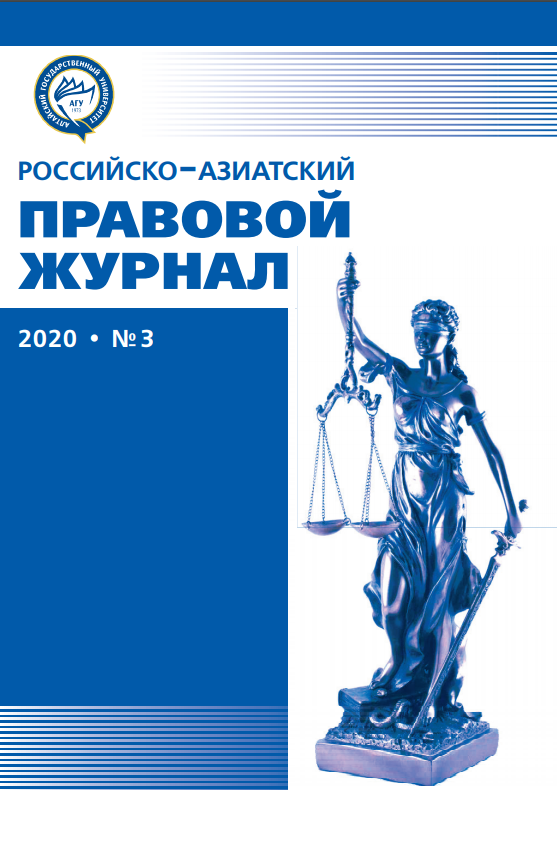COMPARATIVE LEGAL ANALYSIS OF LAWS ON PHYSICAL CULTURE AND SPORTS IN THE RUSSIAN FEDERATION AND THE COUNTRIES OF CENTRAL ASIA
ББК 67.404.9 УДК 34.05
Abstract
The article is devoted to the comparative legal analysis of the laws on physical culture and sports inthe Russian Federation and the countries of Central Asia. The laws of Kazakhstan, Kyrgyzstan, Tajikistan, Turkmenistan and Uzbekistan are analyzed. Structural and semantic similarities are revealed, as well asdifferences in approaches to some issues. Some provisions of foreign laws can be used by the Russianlegislator in the work to improve the Federal Law of 04.12.2007 N 329-FZ “On physical culture and sports inthe Russian Federation”. Based on the experience of these countries, it was proposed to consolidate the listsof rights and obligations of individuals in the field of physical culture and sports, to regulate in more detailthe development of national sports, to specify other possible sources of financing for sports, in addition tobudgetary funds, to strengthen the position of the law on sports in education, health care systems, in theworkplace and in correctional institutions, to increase the role and responsibility of the media in promotingphysical culture and sports. The new provisions of the Russian law regarding the regulation of the activitiesof fitness centers were positively assessed and recommended for use by foreign legislators.
Downloads
References
2. Овчинникова Н.А., Каткова В.В. Особенности правового статуса профессиональных спортивных лиг // Актуальные проблемы российского права. 2018. N 6. С. 109–117.
3. Волкова М.А., Ситдикова Л.Б. Особенности и перспективы нормативно-правового регулирования спорта и физической реабилитации инвалидов и лиц с ограниченными возможностями здоровья // Современное право. 2018. N 3. С. 38–41.
4. Князбаева С.Л. Спортивное право в Республике Казахстан // Актуальные проблемы правового регулирования спортивных отношений : сборник материалов X Международной научно-практической конференции, посвященной 50-летию Уральского государственного университета физической культуры. Челябинск, 2020. С. 74–80.
5. Коваленко Е.Ю., Шавандина О.А. Правовое регулирование международного сотрудничества Российской Федерации с зарубежными странами в области физической культуры и спорта // Российско-азиатский правовой журнал. 2020. №2. С. 96–102.
6. Сидельников А.Н. Управление и государственное регулирование сферы физической культуры и спорта на законодательном уровне // Здравоохранение, образование и безопасность. 2017. №4 (12). С. 74–82.
7. Родионов Л.А. К вопросу о гражданско-правовом статусе спортивной школы в системе образовательных организаций // Социологические и педагогические аспекты образования : сборник трудов Международной научно-практической конференции / под ред. Л.А. Абрамовой, И.Е. Поверинова. Чебоксары, 2019. С. 169–172.
8. Коваленко Е.Ю., Шавандина О.А. Правовое регулирование спортивных отношений в Алтайском крае: проблемы и пути их решения // Актуальные проблемы правового регулирования спортивных отношений : сборник материалов X Международной научно-практической конференции, посвященной 50-летию Уральского государственного университета физической культуры. Челябинск, 2020. С. 80–85.
Russian-Asian Law Journal is a golden publisher, as we allow self-archiving, but most importantly we are fully transparent about your rights.
Authors may present and discuss their findings ahead of publication: at scientific conferences, on preprint servers, in public databases, and in blogs, wikis, tweets, and other informal communication channels.
Russian-Asian Law Journal allows authors to deposit manuscripts (currently under review or those for intended submission) in non-commercial, pre-print servers such as ArXiv.
Authors who publish with this journal agree to the following terms:
- Authors retain copyright and grant the journal right of first publication with the work simultaneously licensed under a Creative Commons Attribution License that allows others to share the work with an acknowledgement of the work's authorship and initial publication in this journal.
- Authors are able to enter into separate, additional contractual arrangements for the non-exclusive distribution of the journal's published version of the work (e.g., post it to an institutional repository or publish it in a book), with an acknowledgement of its initial publication in this journal.
- Authors are permitted and encouraged to post their work online (e.g., in institutional repositories or on their website) prior to and during the submission process, as it can lead to productive exchanges, as well as earlier and greater citation of published work (See The Effect of Open Access).








